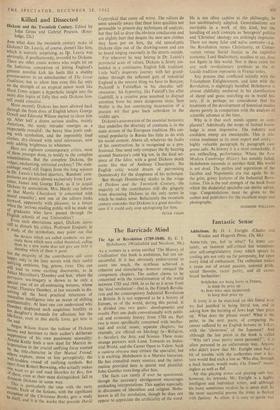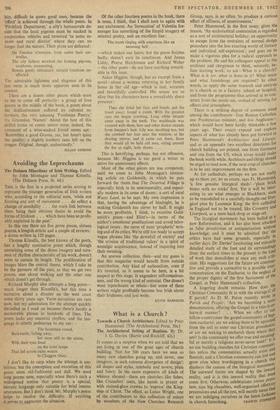Fantastic Sense
Addictions. By D. J. Enright. (Chatto and Windus and Hogarth Press, 12s. fid.) ADDICTED, yes, but to what? To irony cer- tainly, an insistent self-critical but sometimes also self-congratulatory irony which sprays its cooling jets not only on fat pomposity, but upon every kind of enthusiasm. The enthusiast makes a cause out of sexual passion, national pride, social theories, racial purity, and all causes breed barbarities: Artichokes are being burnt in France,
to keep the price up.
As Jews were once incinerated, to keep their price up.
If irony IS to be exercised on this literal level we feel justified in being literal too, and in asking how the burning of Jews kept 'their price up.' What does the phrase mean? What is the point, in the next poem, of comparing the cancer suffered by an English lecturer in Tokyo with the 'cleverness' of the Japanese? And although the last poem in the book is called ' "Why isn't your poetry more personal?",' it is often personal in an unfortunate way. Anyone who didn't know that Mr. Enright once had a bit of trouble with the authorities over a lec- ture would find such a line as 'Who else, through a hack lecture, would make The Times?' mean- ingless as well as flat All this playing down and playing safe has, however, its rewards. Mr. Enright is a highly intelligent and individual writer, and although his irony sometimes misfires he is never dull. In the most successful poems the irony is flecked with fantasy. As often, it is easy to quote bad
bits, difficult to quote good ones, because the 'effect' is achieved through the whole poem. In 'Pitchfork Department,' a city's bureaucrats de- cide that the local pigeons must be stacked in corporation vehicles and removed `to some re- mote and rural district' where they can no longer foul the statues. Their plans are defeated : On Tuesday afternoon, from under their um- brellas, The city fathers watched the homing pigeons, assiduous. unresenting, Bowels gently stimulated, natural functions un- affected.
The admirable lightness and elegance of this last verse is much more apparent seen in its con text.
There are a dozen other pieces which seem to me to come off perfectly : a group of love poems in the middle of the book, a poem about the disillusionment suffered by colonial re- formers, the very amusing `Freshman Poetry,' the Gravesian `Names.' About the best of this skilful ironic or comic minor verse, indeed, the comment of a wine-soaked friend seems apt: 'Resembles a good Graves. yes. hut hasn't quite the quality; a slightly leathery taste left on the tongue. Original, though, undoubtedly.'
JULIAN SYMONS































 Previous page
Previous page